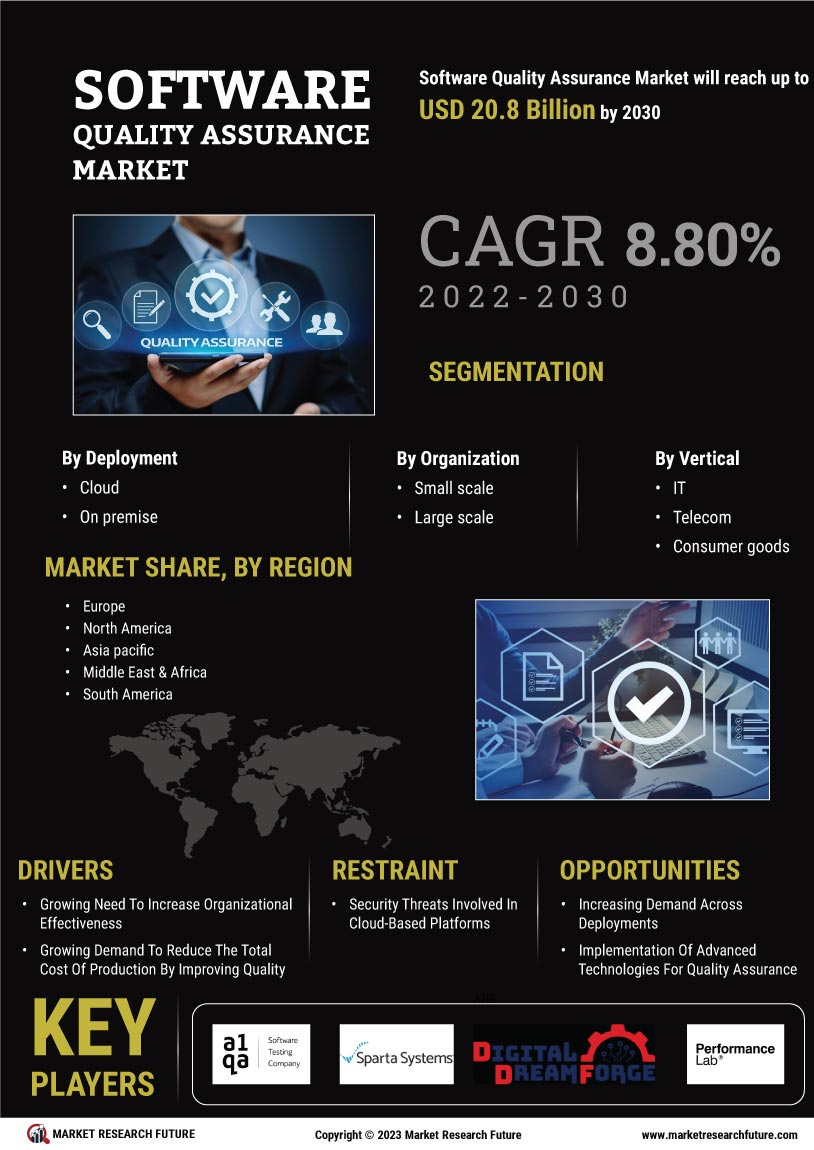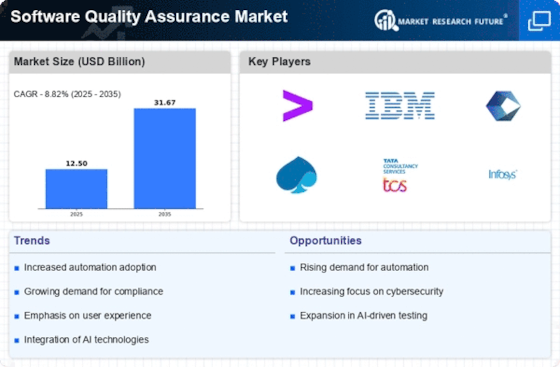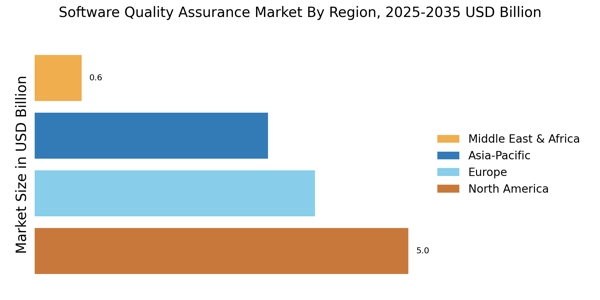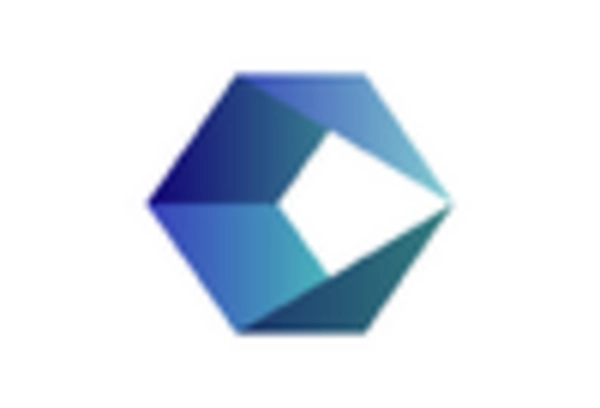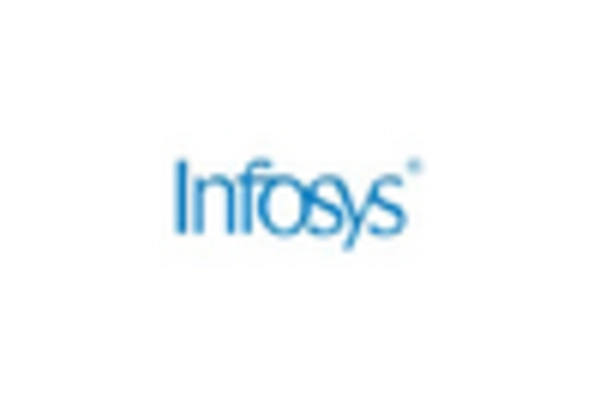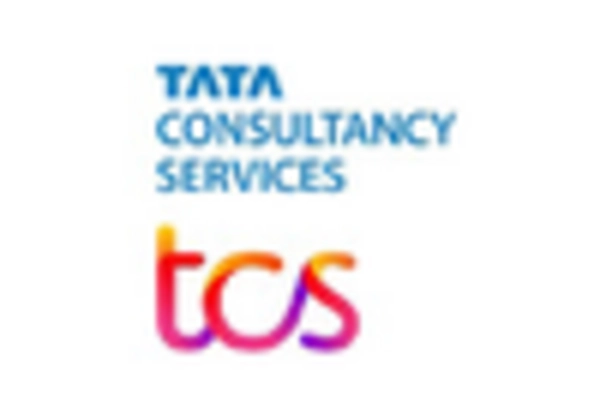Adoption of Agile Methodologies
The Software Quality Assurance Market is witnessing a significant shift towards agile methodologies, which emphasize iterative development and continuous feedback. This transition is reshaping the landscape of software testing and quality assurance, as organizations seek to enhance collaboration between development and testing teams. Agile practices facilitate faster release cycles and enable teams to respond swiftly to changing requirements, thereby improving overall software quality. The integration of quality assurance within agile frameworks ensures that testing is an ongoing process rather than a final step. As a result, organizations are increasingly adopting agile testing tools and practices, which are projected to account for a substantial portion of the software testing market. This shift not only enhances the efficiency of quality assurance processes but also aligns with the growing demand for rapid software delivery in the Software Quality Assurance Market.
Regulatory Compliance and Standards
In the Software Quality Assurance Market, adherence to regulatory compliance and industry standards is becoming increasingly critical. Organizations across various sectors, including finance, healthcare, and telecommunications, are mandated to comply with stringent regulations that govern software quality and security. The need for compliance drives the demand for quality assurance services, as companies seek to avoid legal repercussions and maintain their reputations. For instance, the General Data Protection Regulation (GDPR) and the Health Insurance Portability and Accountability Act (HIPAA) impose strict requirements on software quality and data protection. As a result, businesses are investing in quality assurance processes to ensure that their software products meet these regulatory standards. This trend not only enhances product quality but also fosters consumer trust, thereby contributing to the overall growth of the Software Quality Assurance Market.
Emergence of Cloud-Based Testing Solutions
The Software Quality Assurance Market is experiencing a paradigm shift with the emergence of cloud-based testing solutions. These solutions offer organizations the flexibility to conduct testing in a scalable and cost-effective manner. By leveraging cloud infrastructure, businesses can access a wide range of testing tools and environments without the need for extensive on-premises resources. This trend is particularly beneficial for organizations with limited budgets or those looking to optimize their testing processes. The cloud-based testing market is expected to witness substantial growth, with projections indicating a potential increase in market size by over 30% in the coming years. As companies increasingly adopt cloud technologies, the demand for cloud-based quality assurance solutions is likely to rise, further propelling the growth of the Software Quality Assurance Market.
Focus on Cybersecurity in Software Quality Assurance
In the Software Quality Assurance Market, the focus on cybersecurity is becoming increasingly pronounced. As cyber threats continue to evolve, organizations are recognizing the critical importance of integrating security measures into their quality assurance processes. This trend is driven by the need to protect sensitive data and maintain customer trust. Quality assurance teams are now tasked with not only ensuring functionality but also identifying and mitigating potential security vulnerabilities within software applications. The rise in cyberattacks has prompted businesses to invest in security testing tools and practices, which are projected to grow significantly in the coming years. This heightened emphasis on cybersecurity within the quality assurance framework is likely to shape the future of the Software Quality Assurance Market, as organizations strive to deliver secure and reliable software products.
Increasing Demand for Software Quality Assurance Services
The Software Quality Assurance Market is experiencing a notable surge in demand for quality assurance services. This trend is primarily driven by the increasing complexity of software applications and the necessity for organizations to deliver high-quality products. As businesses strive to enhance customer satisfaction and maintain competitive advantages, the need for rigorous testing and quality assurance processes becomes paramount. According to recent data, the market for software testing services is projected to reach approximately 50 billion dollars by 2026, indicating a robust growth trajectory. This demand is further fueled by the proliferation of mobile applications and cloud-based solutions, which require comprehensive testing to ensure functionality and security. Consequently, organizations are increasingly investing in quality assurance services to mitigate risks associated with software failures and enhance overall product reliability.
